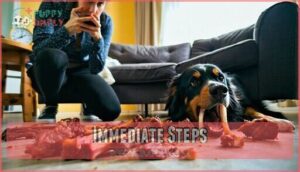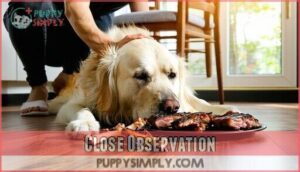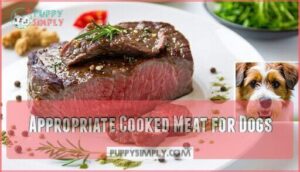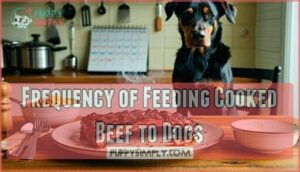This site is supported by our readers. We may earn a commission, at no cost to you, if you purchase through links.
 Dogs shouldn’t eat cooked beef ribs because the bones become dangerously brittle when heated.
Dogs shouldn’t eat cooked beef ribs because the bones become dangerously brittle when heated.
Cooked bones splinter easily, creating sharp fragments that can crack teeth, tear your dog’s mouth and throat, or cause life-threatening intestinal blockages.
While the meat itself is generally safe if it’s plain and unseasoned, separating it completely from the bone isn’t worth the risk.
Raw bones are slightly safer but still pose choking hazards.
Your pup’s curious nose might lead them to these tempting treats, but their safety depends on you saying no to provide smart alternatives.
Smart alternatives and proper preparation methods can satisfy their cravings without the emergency vet visit.
Table Of Contents
- Key Takeaways
- Suitable Bones for Dogs
- Handling Bad Bone Consumption
- Risks of Feeding Rib Bones
- Safer Alternatives to Rib Bones
- Appropriate Cooked Meat for Dogs
- Unsuitable Cooked Meat for Dogs
- Frequency of Feeding Cooked Beef to Dogs
- Frequently Asked Questions (FAQs)
- Can dogs eat beef rib bones?
- Can dogs eat cooked ribs?
- What happens if a dog eats rib bones?
- Can dogs eat raw bones?
- Should dogs eat raw meat?
- What happens if you eat cooked rib bones?
- What Are the Signs and Symptoms if My Dog Has Eaten a Bad Bone?
- What Should I Do if My Dog is Choking on a Bone?
- Are There Any Alternatives to Rawhide Treats for My Dog?
- Is It Safe to Give My Dog Bones From Lamb or Turkey?
- Conclusion
Key Takeaways
- Never give your dog cooked beef ribs – the bones become brittle when heated and splinter into sharp fragments that can crack teeth, tear mouth tissues, or cause life-threatening intestinal blockages requiring emergency surgery.
- Remove all bones before serving cooked beef – while the plain, unseasoned meat is generally safe for dogs, completely separating it from dangerous bones isn’t worth the risk of missing fragments.
- Watch for emergency signs if your dog ate bones – contact your vet immediately and monitor for vomiting, lethargy, bloody stool, constipation, or abdominal bloating, as these indicate serious complications.
- Choose safer alternatives for chewing needs – satisfy your dog’s natural instincts with rubber toys, dental chews, or frozen treats instead of risking bone-related injuries that could cost thousands in vet bills.
Suitable Bones for Dogs
While raw bones can offer dental benefits, you’ll need to understand the risks before giving your dog any bone.
Cooked bones are particularly dangerous because they splinter easily and can cause serious internal injuries or choking hazards.
Beef Bones
Beef bones can be your dog’s best friend when chosen wisely.
Raw beef bones pose fewer risks than their cooked counterparts, which become brittle and dangerous.
Consider these beef bone safety factors:
- Size matters – Choose bones larger than your dog’s mouth
- Raw vs. cooked – Raw bones bend rather than splinter
- Bone marrow – Provides essential nutrients for dog nutrition
- Supervision required – Monitor your pet during raw feeding sessions
- Beef safety first – Source from reputable suppliers only
Raw beef bones support bone health naturally.
Chicken Bones
Chicken bones represent the poster child of dog safety risks.
**Chicken bones: the poster child of canine catastrophe waiting to happen.
These fowl hazards splinter into razor-sharp bone fragments when cooked, creating serious dog choking hazards and internal injuries.
Unlike beef ribs for dogs, chicken bones pose extreme poultry risks regardless of size.
Even raw chicken bones can break into dangerous pieces.
Cooked bones become brittle death traps that can puncture your dog’s digestive tract, making chicken safety a non-negotiable concern for responsible pet owners.
Turkey Bones
Turkey bones present serious bone safety concerns for dogs.
These fragile bones splinter easily when cooked, creating sharp fragments that pose dog choking hazards and internal injuries.
Turkey risks include punctured digestive tracts and blocked airways.
Unlike beef ribs for dogs, turkey’s brittle structure makes it unsuitable regardless of preparation.
Raw turkey bones aren’t safer – poultry hazards remain due to bacterial contamination and splintering potential.
Skip turkey bones entirely for your dog’s safety.
Understanding the risks of raw bone consumption is vital for dog owners to safeguard their pets’ well-being.
Pork Bones
Pork bones present significant pork safety concerns for your dog.
These bones splinter easily when cooked, creating dangerous fragments that can cause choking or internal injuries.
Raw pork bones aren’t much better, carrying swine health risks and potential parasites.
Instead of risking bone risks with pork, consider safer meat alternatives like appropriate beef bones for dogs or specialized chew toys that support canine nutrition without the hazards.
Lamb Bones
While many dog owners worry about lamb bones, these alternatives follow similar safety rules as beef bones for dogs.
Raw bones remain safer than cooked options since cooking makes any bone brittle and prone to splintering.
Large, thick lamb bones with bone marrow offer better lamb nutrition and reduced digestive risks compared to smaller varieties.
However, lamb safety concerns mirror those of cooked beef ribs – splintering creates serious dog bone risks.
For dog bone choking prevention, supervise closely and choose appropriately sized beef rib bones or lamb alternatives.
Raw bones provide natural enzymes while avoiding the dangers associated with cooked varieties that splinter easily.
Handling Bad Bone Consumption
If your dog consumed cooked beef ribs, you’ll need to act quickly to assess the situation and monitor for potential complications.
Swift action can prevent minor accidents from becoming veterinary emergencies when dogs consume dangerous bones.
The next few hours are critical for determining whether emergency veterinary care is necessary.
Immediate Steps
If your dog’s consumed cooked beef ribs, don’t panic—swift emergency response can prevent serious complications.
First, remove any remaining bones from reach and check your dog’s mouth for visible fragments. Contact your vet immediately for professional guidance, even if your dog seems fine.
Many owners underestimate cooked ribs safety risks, but vet consultation provides essential crisis management. Don’t induce vomiting unless specifically instructed—this can worsen internal injuries.
Keep your dog calm and restrict activity while awaiting professional advice. Document the time of ingestion and bone size for your veterinarian’s assessment, and remember that swift emergency response and professional guidance are crucial.
Close Observation
Once you’ve taken immediate action, consistent Pet Supervision becomes your lifeline for detecting potential problems early.
Dog Monitoring isn’t just watching—it’s understanding what normal looks like for your pet so you can spot when something’s off.
Watch for these critical warning signs after your dog has consumed cooked bones:
- Digestive distress – vomiting, diarrhea, or loss of appetite
- Behavioral changes – restlessness, whimpering, or unusual lethargy
- Elimination issues – straining, bloody stool, or constipation
- Physical discomfort – drooling, pawing at mouth, or abdominal bloating
Your vigilance regarding cooked ribs safety can prevent minor issues from becoming veterinary emergencies.
Pay attention to dog eating habits and Chewing Hazards.
When can dogs eat ribs safely? Never when cooked—but your careful observation protects them when accidents happen, ensuring prompt Veterinary Care when needed.
Risks of Feeding Rib Bones
If you’re wondering whether rib bones are safe for your dog, the answer is clear: they pose serious risks that every pet owner should understand.
Both raw and cooked rib bones can cause dangerous health complications, though cooked bones present even greater hazards due to their tendency to splinter and cause internal injuries.
Raw Ribs: Risk
Raw beef ribs pose significant Raw Bone Hazards despite being softer than cooked versions.
Fresh rib bones can still cause Rib Fragmentation, leading to Canine Choking incidents and dangerous Bone Splinters.
These fragments create serious Gastro Risks, potentially puncturing your dog’s digestive tract.
While asking "can dogs eat ribs" seems straightforward, raw beef rib bones carry substantial risks requiring careful consideration before offering them to your pet.
Cooked Rib Bones: Greater Risk
Cooking transforms beef bones into brittle bones that splinter easily, creating dangerous bone splinters and choking hazards.
These cooked bones cause internal damage through sharp fragments that puncture digestive tract walls.
Unlike raw alternatives, cooked beef ribs pose severe digestive issues including blockages requiring emergency surgery.
Avoid all cooked bones—they’re simply too risky for your dog’s safety.
Cooked Rib Meat
When feeding your dog cooked beef ribs, the meat itself poses fewer risks than bones, but caution remains essential.
Remove all seasoning, excess fat, and bones before serving. Cooked meat risks include digestive upset from spices and high fat content that can trigger pancreatitis.
Monitor for meat allergies and make certain proper canine digestion by offering small portions. Dogs eating beef should receive plain, lean cuts for maximum dog nutrition and safety. The key to a healthy diet is providing plain food.
Safer Alternatives to Rib Bones
Given the serious risks associated with cooked beef ribs, you’ll want to explore safer alternatives that satisfy your dog’s natural chewing instincts without compromising their health.
These options provide the same mental stimulation and dental benefits while eliminating dangerous splintering hazards.
Consider these proven safer alternatives:
- Rubber Toys and Chew Sticks: Durable options like Kong toys stuffed with treats offer hours of engagement while promoting healthy chewing habits
- Dental Chews: Specially formulated chews reduce plaque buildup and freshen breath without bone-related risks
- Frozen Treats: Freeze dog-safe ingredients in ice cube trays for invigorating, long-lasting entertainment
Raw Hide Toys present another option, though rawhide alternatives made from sweet potato or other natural materials often prove gentler on sensitive stomachs.
These substitutes address your dog’s instinctual need to chew while supporting their overall well-being.
When selecting safer alternatives, consider your dog’s size, chewing intensity, and any dietary restrictions.
Supervised play guarantees maximum safety and enjoyment for your furry companion.
Many dogs benefit from rubber dog toys that are designed to withstand aggressive chewing.
Appropriate Cooked Meat for Dogs
While you should avoid cooked beef rib bones, you can safely offer your dog properly prepared cooked beef meat.
Plain, lean beef muscle meat and certain organs like heart or liver provide excellent protein and nutrients when cooked without seasoning or excess fat.
Lean Beef Muscle
Several lean cuts of beef provide excellent beef nutrition for your dog’s muscle health. Lean proteins from cooked beef muscle contain 20-25% protein with essential amino acids supporting canine development.
When preparing cooked beef for dogs, cook to 160°F without seasoning for beef safety. This digestible option works well in balanced dog diets, offering vitamin B12, zinc, and iron.
Feed beef meal for dogs moderately—portion control prevents digestive upset while dogs eating beef benefit from this nutritious protein source ensuring cooked beef safety. Understanding beef safety guidelines is vital for dog owners to make informed decisions about their pet’s diet.
Beef Organs (e.g., Heart, Liver)
Organ meats like beef heart and liver offer powerhouse nutrition for your dog’s health.
These protein-packed options deliver essential vitamins and minerals that support heart health and overall well-being.
Key benefits of organ nutrition include:
- Beef Heart: Rich in CoQ10 and B-vitamins for cardiovascular support
- Beef Liver: Contains iron, vitamin A, and folate for energy metabolism
- Easy Digestion: Softer texture than bones reduces choking risks
- Nutrient Density: More vitamins per ounce than regular muscle meat
When preparing cooked beef for dogs, these organs make excellent additions to beef meals for dogs, providing concentrated nutrition without the hazards of bones.
The use of beef heart supplements can further enhance the nutritional value of a dog’s diet.
Unsuitable Cooked Meat for Dogs
While most cooked beef provides excellent nutrition for your dog, certain preparations can pose serious health risks.
You’ll want to avoid fried or fatty cuts, heavily seasoned meats, cooked bones like ribs, and any spoiled beef that could lead to digestive upset or more severe complications, including serious health issues related to the consumption of such foods.
Fried or Fatty Beef
While lean cuts offer healthy protein for dogs eating cooked meat, fatty variations pose significant health risks.
Digestive implications: High-fat content overwhelms your dog’s digestive system, causing stomach upset and diarrhea.
Pancreatitis risk: Excessive beef fat triggers this painful, potentially life-threatening condition.
Weight concerns: Greasy bones and fried meat pack unnecessary calories, promoting obesity.
| Risk Factor | Fatty Foods Impact | Safer Alternative |
|---|---|---|
| Digestion | Stomach upset, diarrhea | Lean boiled beef |
| Pancreas | Inflammation risk | Plain cooked chicken |
| Weight | Excess calories | Portion-controlled treats |
Cooking methods matter: Fried meat contains harmful fatty acids that stress your dog’s system.
Hidden dangers: Greasy preparations often include seasonings toxic to canines.
Choose plain, lean preparations for cooked beef safety – your dog’s health depends on avoiding these fatty pitfalls.
Preserved or Seasoned Beef
Preserved beef products like beef jerky, seasoned meat, cured beef, smoked beef, and marinated beef contain harmful additives for dogs.
Salt levels often exceed safe limits, causing sodium poisoning. Garlic and onion seasonings are toxic, potentially causing anemia.
Chemical preservatives can trigger allergic reactions and digestive upset, making cooked beef safety questionable when dogs eating cooked meat includes these processed varieties.
For safer alternatives, consider exploring seasoned beef options to better understand the risks associated with preserved meats.
Beef Bones (e.g., Ribs)
While cooked beef bones might seem like a natural treat, they’re actually dangerous for your dog’s health.
Cooking makes bones brittle and prone to splintering, creating serious risks that outweigh any potential benefits from dog chewing or beef nutrition.
Here’s what happens when dogs encounter cooked beef bones:
- Sharp splinters pierce mouth tissues and gums during chewing
- Bone fragments create choking hazards in the throat
- Splintered pieces puncture stomach and intestinal walls
- Dense rib bones fracture teeth from excessive pressure
- Internal bleeding occurs from digestive tract injuries
Cooked bones lose their flexibility through the heating process, transforming from safe raw feeding options into potential hazards.
Unlike raw bones that maintain some give, cooked versions become hard and unpredictable.
This affects bone safety substantially, making even simple dog food recipes dangerous when they include cooked bones.
For canine health, skip the cooked beef bones entirely and choose safer alternatives that satisfy your dog’s natural chewing instincts without the emergency vet visit.
This approach ensures your dog’s safety and well-being, avoiding the risks associated with cooked bones, which can lead to serious health issues.
Spoiled Beef
Why risk your dog’s health with spoiled beef? Bad meat harbors dangerous bacteria causing severe food poisoning in canines.
Beef spoilage and meat decay create toxic compounds that wreak havoc on your dog’s gastrointestinal tract. Rotten flesh contains harmful pathogens leading to vomiting, diarrhea, and potentially life-threatening complications.
Always check freshness before serving beef for canine consumption. It’s vital to understand the risks of foodborne illnesses from consuming spoiled meat, including the dangers of bacterial toxin production.
Frequency of Feeding Cooked Beef to Dogs
Most veterinarians recommend treating cooked beef as an occasional indulgence, not a regular meal. Following proper feeding guidelines means limiting beef to no more than 10% of your dog’s total diet.
Feeding cooked meat for dogs more than twice weekly can trigger digestive upset and nutritional imbalances. Dog nutrition experts emphasize moderation prevents pancreatitis from high-fat content.
Smart canine health practices involve using beef as special treats while maintaining complete, balanced meals as your dog’s foundation. To make safe feeding practices a priority, note the risks of cooked bone fragments.
Frequently Asked Questions (FAQs)
Can dogs eat beef rib bones?
Picture sharp bone fragments like tiny daggers threatening your dog’s digestive tract.
You shouldn’t give your dog cooked beef rib bones because they splinter easily, causing choking, internal injuries, or life-threatening blockages requiring emergency surgery.
Can dogs eat cooked ribs?
No, you shouldn’t give your dog cooked ribs.
They become brittle and splinter easily, creating serious choking hazards and potentially puncturing your pup’s digestive tract—a dangerous situation requiring emergency vet care.
What happens if a dog eats rib bones?
When bones splinter inside your dog’s body, trouble follows fast.
Cooked rib bones break into sharp fragments that can puncture the digestive tract, cause choking, or create life-threatening blockages requiring emergency surgery, which can be a life-threatening situation.
Can dogs eat raw bones?
Yes, you can give your dog raw bones, but choose wisely.
Large, thick raw beef bones are safest – they won’t splinter like cooked ones.
Always supervise closely and consult your vet first.
Should dogs eat raw meat?
Raw meat walks a tightrope between benefit and risk for dogs.
While some thrive on carefully prepared raw diets, you’ll need veterinary guidance to navigate potential bacterial contamination and nutritional imbalances safely.
What happens if you eat cooked rib bones?
If you eat cooked rib bones, you’re risking serious trouble. They splinter into sharp fragments that can cause choking, puncture your digestive tract, or create dangerous blockages requiring emergency surgery.
What Are the Signs and Symptoms if My Dog Has Eaten a Bad Bone?
Last month, Max, a golden retriever, devoured cooked chicken bones from the trash.
Within hours, he showed classic warning signs you’d expect.
Watch for vomiting, lethargy, loss of appetite, constipation, bloody stool, straining to defecate, or abdominal bloating.
Contact your veterinarian immediately if these symptoms appear.
What Should I Do if My Dog is Choking on a Bone?
If your dog is choking on a bone, stay calm and act quickly.
Open their mouth, check for visible bone pieces, and carefully remove them with tweezers if possible.
Contact your veterinarian immediately for emergency guidance.
Are There Any Alternatives to Rawhide Treats for My Dog?
Yes, there are excellent alternatives to rawhide treats.
Consider bully sticks, dental chews, frozen Kong toys, sweet potato chews, or antler pieces.
These options provide safe chewing satisfaction without rawhide’s potential digestive risks, making them a great choice for pet owners who want to avoid the dangers of rawhide.
Is It Safe to Give My Dog Bones From Lamb or Turkey?
Ironically, while lamb and turkey seem wholesome, both pose serious risks to your dog.
Lamb bones splinter dangerously when cooked, causing choking and internal injuries.
Turkey bones break easily, creating sharp fragments that can puncture your dog’s digestive tract, requiring emergency surgery to address the damage caused by these sharp fragments.
Conclusion
Better safe than sorry regarding your furry friend’s health.
The answer to "can dogs eat cooked beef ribs" is a clear no.
Cooked bones become brittle and dangerous, posing serious risks to your dog’s safety.
While raw bones aren’t recommended either, safer alternatives like appropriate chew toys or plain cooked beef meat can satisfy your pup’s cravings.
Always prioritize your dog’s wellbeing over their momentary desires for potentially harmful treats.
- https://www.petmd.com/dog/nutrition/can-dogs-eat-rib-bones
- https://www.justanswer.com/veterinary/o65it-ok-let-dog-chew-beef-rib-bone-beef.html
- https://animalemergencyservice.com.au/blog/cooked-bones-dangerous-for-dogs
- https://www.dailypaws.com/dogs-puppies/dog-nutrition/what-can-dogs-eat/can-dogs-eat-rib-bones
- https://www.petinsurancequotes.com/blog/pet-advice/can-dogs-eat-rib-bones












